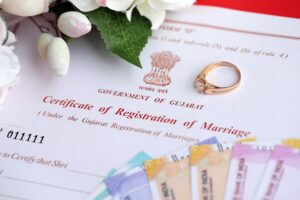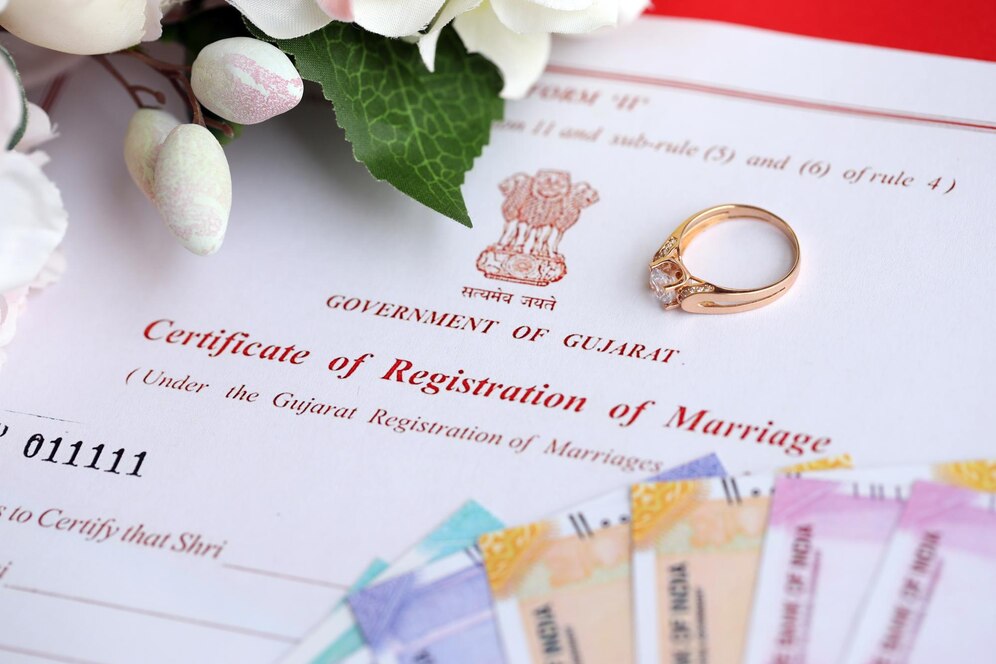Introduction
Court marriage is a legally recognized way for couples to get married without the need for religious ceremonies. It follows the provisions of the Special Marriage Act, 1954, ensuring that marriages are valid under Indian law. Whether the couple belongs to the same or different religions, court marriage provides a simple and hassle-free process. In this article, we will explore the steps, legal requirements, and important aspects of court marriage in Ghaziabad.
Eligibility Criteria for Court Marriage
Before applying for court marriage, couples must meet the following conditions:
- Age Requirement: The groom must be at least 21 years old, and the bride must be 18 years old.
- Mental Stability: Both parties should be mentally sound and capable of making decisions.
- Marital Status: Neither party should have a living spouse at the time of marriage. If previously married, a legal divorce decree or death certificate of the former spouse is required.
- Prohibited Relationships: The couple must not fall within prohibited degrees of relationship unless their customs allow it.
Documents Required for Court Marriage
To complete the court marriage process in Ghaziabad, both applicants must submit the following documents:
- Identity Proof (Aadhar Card, Passport, Voter ID, or Driving License).
- Address Proof (Ration Card, Utility Bill, Rent Agreement, or Passport).
- Birth Certificate or Matriculation Certificate (for age verification).
- Passport-sized Photographs (usually six each).
- Affidavit of Marital Status (confirming single/divorced/widowed status).
- Divorce Decree or Death Certificate (if previously married).
- No Objection Certificate (NOC) (for foreign nationals).
Step-by-Step Process of Court Marriage in Ghaziabad
1. Filing the Marriage Notice
The couple needs to submit a Notice of Intended Marriage to the Marriage Registrar in Ghaziabad. This notice must be given at least 30 days before the planned marriage date. The registrar displays this notice publicly to invite any objections.
2. Objection Period
During the 30-day waiting period, any person can raise an objection if they believe the marriage violates legal conditions. If no objections arise, the marriage can proceed.
3. Verification of Documents
The registrar verifies all submitted documents, including identity proof, age proof, and address proof, to ensure compliance with legal norms.
4. Marriage Solemnization
After successful verification, the marriage is solemnized in the presence of the Marriage Officer and three witnesses. The couple must sign the marriage register, confirming their consent to the marriage.
5. Issuance of Marriage Certificate
Once the procedure is completed, the court issues a Marriage Certificate, which serves as legal proof of the union. This document is essential for various legal and official purposes.
Benefits of Court Marriage
- Legal Recognition: The marriage is legally binding and recognized under Indian law.
- Interfaith & Inter-Caste Marriages: Court marriage allows couples from different religions or castes to marry without any restrictions.
- Simplified Process: The procedure is straightforward and avoids the complexities of traditional weddings.
- Cost-Effective: Court marriages are more affordable compared to grand wedding ceremonies.
- Legal Protection: It offers legal security to both partners, ensuring their rights in case of disputes.
Common Challenges & Solutions
- Objections from Family or Society: Some families may oppose court marriages, especially interfaith ones. Seeking legal advice and counseling can help address such issues.
- Delays in Document Processing: Ensuring all documents are correctly prepared can help avoid delays in the registration process.
- Finding Reliable Witnesses: The couple must arrange three witnesses, which can sometimes be challenging. They can seek help from friends, colleagues, or legal professionals.
Conclusion
Court marriage in Ghaziabad is a convenient and legally secure way for couples to get married. By following the correct process, submitting the required documents, and adhering to legal formalities, couples can ensure a smooth and hassle-free marriage registration. Whether opting for a same-religion or interfaith marriage, the Special Marriage Act, 1954, provides equal rights and protection for all couples.






